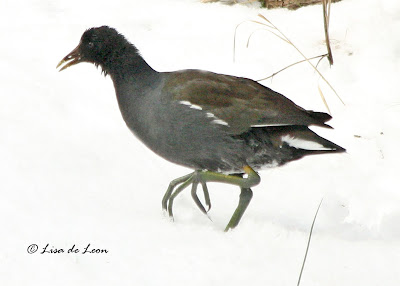When the opportunity arose to make a trip to see this bird, I jumped at the chance. It is so different and unique. It does, however, bear a strong resemblance to the American Coot. (Six American Coots have made St. John's their Winter home.) That is rare enough but the Common Moorhen is much more rare. By browsing the NL Bird Discussion Group archives, I found five previous sightings since 1997. That can only be one indicator of the visits made by Common Moorhen in the past as these reports are not official records of any kind.
When my partner and I first came upon the Common Moorhen it was nestled down in a small ditch with a stream running through it. Most of water was frozen already and the bird was struggling to find its food supply of aquatic vegetation, snails and other invertebrates. I should add that this was before the two huge snowfalls that happened this week and the dipping temperatures. That offers more challenges to survival. Of all of the stray birds that have inadvertently found themselves here, this one seemed the most distressed. That would make a lot of sense because this
bird should be wintering in Southern
California and Mexico. It must have been some wind that blew it so far off course.
This bird, although I didn't see it, swims much like the American Coot propelling itself across the water by bobbing its head and neck.
It is a real treat to see this chicken-like bird here. When I look at the feet of this bird, I can't help but see the strong connection with dinosaurs. What must its ancestors have looked like?




